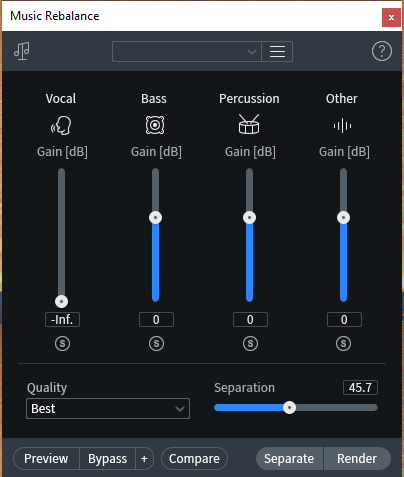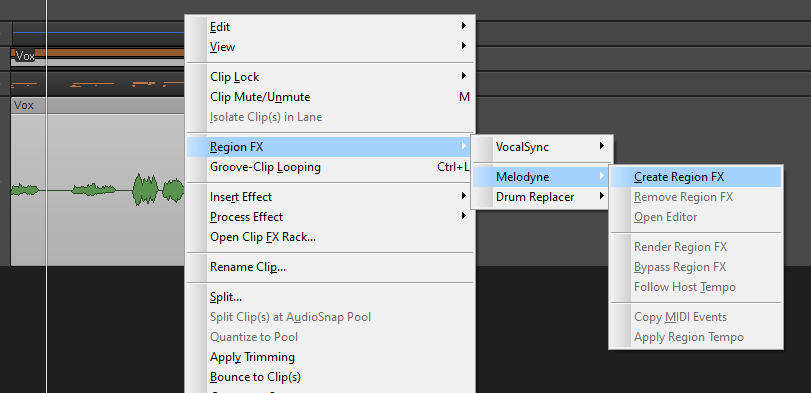-
Posts
3,369 -
Joined
-
Last visited
-
Days Won
22
Everything posted by bitflipper
-
iZotope Rx has a feature that lets you independently adjust drums, bass, vocals and everything else. In my experiments with it, there were artifacts that made it less than ideal, but for a casual application such as tweaking karaoke files it might work. But it won't separate out every track from a full mix. Intelligent processors are coming that will take this breakdown much farther, but for now this represents the state of the art.
-
Panning in Cakewalk works like the balance knob on a stereo, which is two ganged volume controls wired in reverse of one another. Literally just two complementary volume knobs. So yeh, the pan knob is literally just a volume knob. But there are two of them. Although this can get weird with some stereo tracks, for mono tracks it's normally exactly what you want. You are literally adjusting the levels (volume) of the track's left and right outputs. With a mono track and mono interleave, you should always have some information in both the left and right track outputs unless the pan slider is at 100%. So normally, as you push the slider to the left, you are turning down the right until all you hear is the left channel. If the track then becomes silent, it means there was no left channel information. How can you have a track with no left or no right information? If it's mono, you normally won't. But you can if it's a stereo track that only has information on one side. And that is a frequent mistake. When you create a new audio track, it defaults to stereo. If you then plug your guitar into a channel on your interface and hit record, everything looks fine - but you are recording only half of a stereo track. When you attempt to pan it to the silent side, well, it goes silent. Maybe that's not what's happening; it's not possible to tell without the project or at least a screenshot of it.
-
Is the issue with a single track, or with the entire mix? Assuming a single track, the symptom you describe sounds like a stereo track with information on only one side. That can be because it was initially recorded as stereo but with audio on only one channel, or it can be caused by a mono plugin (or an incompatible combination of stereo and mono effects). If you don't want to post a test project, a screenshot might provide the needed clue.
-
My favorite Rush album. Yes, I know, I'm in the minority with that opinion.
-
A de-esser is not the right tool for this. What you need is a noise remover, which is something you're more likely to find in an audio editor rather than a DAW. For a noise remover to work properly, you need a piece of audio that contains only the hiss. It needn't be a long sample. A little fragment that is audible within a stretch of silence is all you need to find. The de-noiser will take a spectral snapshot of that noise and then suppress those frequencies where they exceed a threshold. Actually, it's a lot like what a de-esser does, except that it's far more targeted and thus more transparent. The process of noise removal is destructive and not real-time. You specify the noise sample and then run the removal process. If you have a good sample of the noise you want removed, these applications do an amazing job. The noise just goes away like magic, without affecting anything else. And best of all, with no fiddling. As noted prior, good audio editors cost $$. The most popular atm is Rx, which will run you $400 for the cheapest edition that offers noise reduction. However, it is currently on sale for half off, so 200 bucks. Should also note that you can try it out for free (for a month, iirc), so if this is a one-off situation you could just use the trial. Another one I've used that's pretty good and is popular around here is Sony's SoundForge, but I don't know what its current status is or its price. Back in the day I paid $100 for it, but that was quite awhile ago (I stopped using any Sony products after the infamous rootkit fiasco). I wouldn't be surprised if they'd since replaced it with something newer and undoubtedly more expensive. My current go-to noise remover is a very old version of Adobe Audition (AA3). It works great, but I don't recommend it because you can no longer purchase the editor, only rent it via subscription. And now the good news. Audacity is a free DAW that does include a noise reduction feature. It's not as good as Rx or Audition but given the price of $zero it's worth a shot.
-
There is no active iZotope forum as far as I know. Of course, any tips would be welcome in this forum, as a great many of us are longtime iZotope users.
-
When a computer unexpectedly shuts down and reboots, it's most often a failing power supply. I have also seen it happen when there was a shorted decoupling capacitor on the motherboard that overheated the power supply. Either way, it's gonna take a trip to your local computer fixit guy. It should not be possible for a software instrument to power down and reboot the computer. At worst, it will only crash the DAW and leave a crash dump for analysis. It could be coincidence that there appears to be a correlation to Omnisphere. You might want to take a look in %appdata%\cakewalk\cakewalk core\minidumps and see a dump file is there with the date and time of your shutdown. Although unlikely, it's possible there's a clue in there. It's also worth scrolling through the Windows Event Viewer to see if there are any entries in the System Log that correspond to the date and time of your shutdown.
-
Start by deleting %appdata%\cakewalk\cakewalk core\aud.ini. When you run Cakewalk, it will automatically recreate this file with default settings. That may let you start up the program again. Realtek is compatible with ASIO, but you'll probably want to download the official driver from Realtek. If you still have issues, try WASAPI. Pretty much works with anything and the performance rivals ASIO. Interesting that the message you're seeing doesn't seem to be the result of testing your Realtek interface, but rather something called "HD Audio Driver for Display Audio". Do you maybe have an external display with built-in speakers? See if you can disable this driver. Open Device Manager (type "device manager" into the Windows search bar) , expand "Audio Inputs and Outputs" and see what's listed there. Anything other than the Realtek driver can be disabled. Oh, and welcome to the forum, Chuck.
-
I always bounce Melodyne clips before saving and exiting the project. It was a habit I adopted many years ago, when Melodyne was not as seamlessly integrated into the DAW as it is today. This avoids a lot of potential problems. The wrinkle is that Melodyne is actually its own process and works on files that it created and has stored external to the DAW project, so you have to think of them as temporary files. Once you've rendered (bounced) the clip, though, Melodyne is done with it and everything's safely stored within the Cakewalk project. The best way to invoke Melodyne is via an ARA Region. Right-click the top of the clip you want to edit and select Region FX -> Melodyne -> Create Region FX. When you're done with your edits, return to this same context menu and select Render Region FX.
-
I totally forgot that my default project template has Ajax Adult Novelties as the vendor name, with the primary author listed as "Buck Futz".
-
I ran Norton Power Eraser today, just because I'd never used it before and wanted to check it out. This tool may be useful, but in my test the results were laughable. The first two are programs I wrote myself. The next two are Microsoft products. Conduct.exe is the Continuata installer, used by several sample library vendors. The last is iZotope RX8. I can see the logic behind Continuata, as it is an installer. But NPE did not identify any of my other installers (e.g. 8Dio, Arturia, AudioModeling , iZotope, Native Access, Toontrack). I guess this is a good result, since it suggests I don't have any real malware issues. But I can imagine users blindly removing software without closely examining what it is that they're actually quarantining. In the past I've had virus scanners identify audio plugins as potential malware. On at least one occasion, even wave files were so flagged.
-
Try switching from ASIO to WASAPI Shared.
-

How to get my older projects to play?
bitflipper replied to bobernaut's topic in Cakewalk by BandLab
Try opening the project in Safe Mode (hold SHIFT while loading). If the project opens in safe mode, that would confirm that the problem is with a plugin. If it still doesn't open, then it's likely you have a corrupt file, in which case the only way forward is to reconstruct the project file by file. -
Are you suggesting that music may not always be a reflection of life? I listened to "Set Your Troubles Free", and it would appear that Talent is already in your toolkit.
-
I've been lobbying for the return of the Talent plugin. April's coming.
-
I thought I knew all about this process, but my knowledge was 50 years out of date. I want the job of the guy who listens to every master. Or maybe not. Just because it's on vinyl doesn't mean it's any good.
-
- 2
-

-
There have been three beta releases this year. Combined, they include about 30 bug fixes and some nice enhancements. I can't talk about them per my NDA, but they're going to be very welcome additions. Some old favorites from SONAR days will be coming back, so everybody who came onboard after SONAR's demise are going to get some new goodies. But even you old SONAR guys will smile when you see the new version.
-
If you have a lot of plugins and suspect one of them may be problematic, use a binary approach. Note that it doesn't necessarily have to be a plugin that's at fault; a corrupt audio file or buggy software instrument can cause the same symptoms. Perhaps even a prepared track, e.g. a Melodyne region or one whose transients have been marked for timing edits. That's why I prefer to delete whole tracks to narrow the search rather than focusing initially on plugins. Open the project and delete half the tracks. Whether the problem persists or goes away, you'll have eliminated half the clips, effects and soft synths in the project as potential suspects. Continue halving them until the problem track is isolated, then follow the same binary process of elimination for the plugins on that track. Note that when eliminating plugins, you need to delete them from the project, not just bypass them. That a real-time bounce works but a "fast" bounce doesn't suggests to me a soft synth or corrupt audio file is slightly more likely than a plugin. Try copying the entire project to another location, preferably a different drive, and export from there.
-
Ah, yes, the acid days. I have not since experienced a gig so satisfying as one where everyone in the entire venue was tripping, including the band. At least, I think it was awesome, although admittedly few actual details made it into longterm memory.
-
Yes, but there isn't much on it at the moment, as we're currently woodshedding with a new member. Just played our first gig with him last night. He's good, but we've got a long way to go. Should be ramping up soon, though. Summer's coming. Give me a heads-up when you'll be in the area.
-
I have seen this phenomenon. It was long ago, so the details are hazy, but it had to do with some interaction with another plugin that preceded the Sonitus effect in the same fx bin. Also had issues with the Sonitus Delay. Both would work fine on their own but went crazy in combination with other plugins. And both get cranky sometimes when you automate their controls or tempo changes. I doubt it has anything to do with being DX and more to do with just being neglected for 20 years. My solution was to move away from the Sonitus effects, which is a shame because they all sound good and are easy to use. You might want to look into one of the many free or cheap reverbs that are out there, such as Voxengo's OldSkoolReverb, SuperMassive from ValhallaDSP, or the TAL Reverb. Granted, all of these are someone limited one-trick ponies, but they sound fine and are free.
-
It just means some enhancements take longer to implement than others. Beta releases are still happening, so nobody's died or been institutionalized. Plus even Noel gets a day off once in awhile, or so he claims.
-
For decades my nickname was Bilbo. From The Hobbit, of course. Tolkien wasn't mainstream back then like he is today, but every college student read him, along with Carlos Castaneda. I got hooked after reading The Hobbit in one all-night sitting, on LSD, sitting in the courtyard of the dorm. Our college band was called "Bilbo's Tired Head", from a line in The Hobbit. People would come up and ask which one of us was Bilbo, and my bandmates would point to me. I don't know why. I don't have large feet and they're not hairy. Using a distinct nickname has its advantages. I could call somebody up that I hadn't spoken with in years and say "Hi, this is Bilbo" and they'd never have to ask "Bilbo who?". There are probably still people in the world who never knew my real name. I stopped using it when I realized that many were mis-hearing it as "*****". My user name on KVR is still bbaggins. [EDIT] Apparently, you can't say "*****" here. You can buy one at Walmart, but don't dare say it out loud.
-

Recent concerts from "legacy" bands that impressed you....
bitflipper replied to hockeyjx's topic in The Coffee House
The Zombies. Yeh, those guys show their age on their faces, but they've still got chops. And it wasn't just a case of playing the same songs for 50 years and getting them down (see Doobie Brothers) because they included novel arrangements and extended jams. -

Article > Best drum machine plugins 2023 (musicradar)
bitflipper replied to user905133's topic in Instruments & Effects
Ironic that #1 emulates hardware that I couldn't wait to get rid of back in the day.








